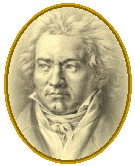

MIDI Files | Recommended Recordings | Books and Printed Music
Ludwig van Beethoven was born in Bonn Germany in the year 1770 to Johann van Beethoven and Maria Magdalena. We don't know the exact date of his birth, but the research points to some time in March. Ludwig was the second child out of seven, and one of the only three to survive childhood.
Ludwig's Childhood:
Ludwig van Beethoven suffered a tragic childhood. His father was an alcoholic and often abused him. Johann would force Ludwig to practice all of the time, and when Beethoven would make a mistake, he would slam the piano cover on his knuckles and make him play it over again. Moreover, if Beethoven would play a piece perfectly, his father would not provide any positive reinforcement. Often times, Johann would stay out late drinking with his buddies, and then bring them home at one o'clock in the morning to listen to little Ludwig play. Of course a little boy of Beethoven's age would be asleep at this hour of the night, but that didn't stop Johann. He would slap little Ludwig in the head to get him up, and make Ludwig play for all of his drunken buddies. They all would critique his playing, and correct him with force if he messed up. Because Beethoven was so poorly treated by his father he developed a close relationship with his mother. She died when Beethoven was a teenager, this devastated Ludwig. Because Johann was increasingly becoming worse and worse with his drinking, he had lost his job as a tenor at the Electoral court. Beethoven, realizing that he now had to support himself and his brothers, sought work, and by 1782 he served as deputy organist when Christian Neefe (Court Organist) took leave. By this time, Beethoven was already composing works and was considered to be a piano virtuoso, and the next year, Ludwig was hired as orchestral harpsichordist at the court.
Ludwig's Adulthood:
In 1792, Haydn visited the Bonn court on his way back from Vienna; it was here (the Bonn Court) that Beethoven met Haydn. Ludwig showed a funeral Cantata (Honoring the recently deceased Emperor Joseph II) to the composer, and Haydn was extremely impressed and offered to study with Beethoven. Beethoven spent a year studying with Haydn in Vienna, and then lost interest in his teachings. It is said that Beethoven and Haydn grew to not like each other, or their writings, but Beethoven still dedicated various works to Haydn. After studying with Haydn, he studied with Johann Schenk in the field of composition and counterpoint. And soon thereafter, studied with Antonio Salieri.Beethoven really didn't have a steady job. He made most of his money by playing the piano in Salons at gatherings and giving piano lessons to wealthy students. Basically, Beethoven was one of the first "accepted" freelance composers in Vienna.Beethoven quickly gained popularity in the Vienna court and in the town. He often challenged people to test their musical ability. Beethoven knew how to manipulate themes as if it took no work at all. He was also the best sight-reader since Mozart. One day Beethoven challenged a singer, stating that he could throw the singer off by varying his themes by playing them on the organ. He was quite successful; Beethoven had won the challenge.
Beethoven's Personality:
In the midst of his gaining popularity, Beethoven gained quite an ego. If Beethoven for some reason did not like the audience he was to perform for, he would not play. If he were in the middle of a concert and a member of the audience was the slightest bit "out of place" (behavior wise) he would walk off of the stage. On top of having a great ego, Beethoven was quick to anger. One time Beethoven was eating a bowl of soup in a restaurant and he didn't like the service he was receiving, so he poured the hot bowl of soup on the waiter and stood there laughing at the man. He also had a scuffle with his brother; Nikolaus Johann gave a business card to Beethoven that read: "Johann van Beethoven –landowner" Beethoven turned the card over and scribbled "Ludwig van Beethoven –brain owner."Documents show that Beethoven was also poorly kept. He was short and stocky, and on many accounts reported as being ugly. His face was scarred from smallpox he had contracted as a child. He had a deep cleft on his chin, and a dark complexion. In his earlier years Beethoven dressed quite nicely, but in his later years his personal hygiene became much worse. Some of his friends admitted to sneaking in to Beethoven's room and stealing his old clothes and burning them, only to replace them with new clothes. Beethoven was completely oblivious of these events.
Beethoven After 1800:
After the completion of his 1st symphony, Beethoven noticed the first signs of deafness. This was attributed to either Otosclerosis or nerve damage, depending on where you get your sources from. Beethoven tried to hide his deafness as much as possible. A deep depression followed this. Beethoven tried his best to seek as much medical help as he could, but he dismissed their advice because instant results were not in occurrence. Beethoven often suffered from massive colds and other illnesses that made him bed ridden for weeks. This did not stop Beethoven from composing music. Although in one point of his life, he was so deaf he could not perform anymore, he still composed. To hear his own compositions, he sawed the legs off of his piano and placed the piano on the floor, and pressed his ear to the floor as well. He would then proceed to bang on the keys, to hear what he had written.When Beethoven was not sick, or suffering from asthma, he would often take a sketchbook with him and take long strolls in the country. We get a lot of information about the way Beethoven worked, and his creativity in composing from these sketches. It is a fact that right before Beethoven's death he was writing a 10th symphony. Beethoven often made corrections, and several drafts before settling down with a finished composition. This is quite the contrary to how Mozart composed music.
During the later years of his life, Beethoven became more and more depressed. He wanted to become the legal guardian of his nephew Karl because his Guardian was not treating him right. He was successful after many years of battling with his sister in law (according to some sources), but Karl did not get along with Beethoven for the most part, even though Beethoven loved him more than anything else. On several accounts, Karl attempted suicide. Beethoven often had a hard time keeping women. He either lost interest in the women, drew them away with his temper, or the woman he was engaged with was already married. He once asked a woman to marry him, and she responded; "you are ugly and half crazy, of course not." On top of all of this, Beethoven was getting to the point where he could hear nothing at all. One time he was conducting an orchestral piece that he had written and he was so into how the piece should sound in his mind that the orchestra could barely keep up. After the finale of the piece Beethoven had to be physically turned around to see his standing ovation as tears trickled from his eyes.
Beethoven's Death:
Otosclerosis is a progressive disease that is said to diminish one's physical health as well as mental health. In September of 1826, Beethoven's abdomen started to swell with fluid and his feet swelled as well. Diarrhea and vomiting were an everyday occurrence. In March of 1827, Beethoven's Illness finally caught up with him. On March 24, 1827 Beethoven fell unconscious and died. Because Beethoven was so popular in Vienna, it is said that 1 of every 10 people who lived in Vienna attended Beethoven's funeral.To many, Beethoven represents the highest level of musical genius keeping in mind composers such as: Bach, Mozart, Handel, and Haydn. Beethoven's life was very productive, given that he had no formal education past the 5th grade, and of all of his hardships in which he had to deal with. His catalog includes: *9 symphonies *Wellington's Victory *2 independent orchestral concert overtures *Incidental music for 6 drams (Egmont, The Ruins of Athens) *2 ballets *1 Opera *2 Masses *Fantasias and Oratorios *9 piano trios *32 large piano sonatas *16 string quartets *Many arias & songs *Almost 200 arrangements of folk songs with piano and trio accompaniment. (Stolba Western Heritage 406). And much more.
Beethoven set the trend for the entire Romantic period. Composers after Beethoven could not get around Beethoven and the standards he set for music of the future. Beethoven even stated that the music that he composed throughout his life was for the future. And here we have composers in the Romantic Period not writing Operas because the Great Beethoven's opera (Fidelio) failed. Beethoven expanded the orchestra (made it larger); he was one of the first to attach movements together, and one of the first to include a choir in a symphony. He was NOT the first to include a choir in a symphony, but he was the first man to do it right. Beethoven also expanded the musical length of the symphony. He expanded the development of the symphony, and added new material in the coda. Beethoven is a perfect example of how someone can be a romantic composer (turning tragedy into triumph) -composing music because of the impeccable urge to. QUOTE: The Heiglnstadt Testament Beethoven wrote: "Only my art held me back. Ah, it seemed to me impossible to leave the world until I had produced all that I felt was within me; and so I spared this wretched life – truly wretched for so susceptible a body, which by a sudden change can reduce me from the best condition to the very worst" (Heiglnstadt 6 October 1802). Beethoven said it best when he said "Princes will come and go, but there is only one Beethoven."
Written By: Joe Meerdter Credentials: Music Education Major at Towson University